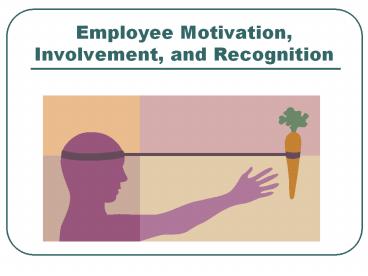Employee Motivation, Involvement, and Recognition - PowerPoint PPT Presentation
Title:
Employee Motivation, Involvement, and Recognition
Description:
Personal well-being of workers. Job characteristics. Workplace characteristics ... employee surveys and suggestion systems. Training and education ... – PowerPoint PPT presentation
Number of Views:4359
Avg rating:3.0/5.0
Title: Employee Motivation, Involvement, and Recognition
1
Employee Motivation, Involvement, and Recognition
2
Requirements For Todays Managers
- In alignment (to be on the team)
- Thinking out the box (be creative)
- Empowering employees
- Maintaining core competencies
- Managing change
3
Requirements For Todays Employees (1 of 2)
- Flexibility - accept change readily
- Clock speed - move faster, think faster
- Accept ambiguity uncertainty
- Stay current - commit to life-long learning
- Contribute - add more value than you take
4
Requirements For Todays Employees (2 of 2)
- Manage yourself - fixer not finger pointer
- Dont get a job, make a job
5
How Does the Workforce Affect Productivity?
6
How Does the Workforce Affect Productivity?
- Composition of the workforce
- Characteristics of life off the job
- Personal well-being of workers
- Job characteristics
- Workplace characteristics
- Employee satisfaction and motivation
7
How Can An Organization Motivate Its Employees?
8
Strategies for Improving Motivation
- Implement effective performance evaluation
systems - Implement individual rewards recognition
systems - Improve work design and job design
- Promote employee involvement
- Solicit employee feedback systematically
9
Work Design Techniques for Improving Productivity
- Streamline work processes
- Adopt team (group) concepts
- Deploy Quality of Work Life (QWL) practices
- Implement group reward recognition systems
- Design effective layouts and work cells
10
Job Design Techniques for Improving Productivity
- Job simplification
- Job rotation
- Job enlargement
- Job enrichment
- Job sharing
11
Teams and Productivity
- Content (goals and outcomes) and process (how the
team accomplishes tasks) - productive teams pay
attention to both. - Cohesion - Team must be cohesive but must not
want agreement more than accuracy (or quality of
outcome).
12
Undercurrents in Team Dynamics
- Personal identity in the group
- Membership, inclusion
- Influence, control, mutual trust
- Getting along, mutual loyalty
- Identity with the work unit
- Effects on relationships with co-workers and
loyalty to work unit
13
Undercurrents in Team Dynamics (Continued)
- Relationships between team members
- Effects on rank and positions
- Friendship and formality
- Openness
- Personality preferences
14
Employee Involvement
- Employee involvement means allowing employees to
participate in work-related decisions and
improvement activities that affect them. - This doesnt mean anarchy, but it means that
management shares its responsibilities in
decision-making with employees.
15
What Are the Potential Benefits of Employee
Involvement?
16
Benefits of Employee Involvement
- Increases trust and commitment.
- Improves employee communications and attitudes.
- Involved employees are more likely to generate
new ideas and achieve a higher quality of work
life - Reduce the workload of managers
17
Levels of Employee Involvement
- Inter-group problem solving
- Focused problem solving
- Limited self-direction
- Total self-direction
- Information sharing
- Dialogue
- Individual problem solving
- Intra-group problem solving
18
Approaches to Involving Employees
- Commitment from management
- Must be long-term, ongoing attempts
- Communications efforts
- feedback
- bottom-up communications
- employee surveys and suggestion systems
- Training and education
19
What Are Characteristics of An Effective
Recognition System?
20
Characteristics of An Effective Recognition System
- Meaningful and fair
- Fun and non-threatening
- Publicize extensively
- Input from employees on the system
- Tied to performance evaluation system
- Allow nomination from employees and customers
21
Conclusions
- Productivity improvement (PI) is critical to
every organization for survival - Every employee should have basic knowledge and
skills to contribute to PI - Organizations need to have clear PI strategies
- Successful PI does not ensure long-term
profitability nor competitiveness































